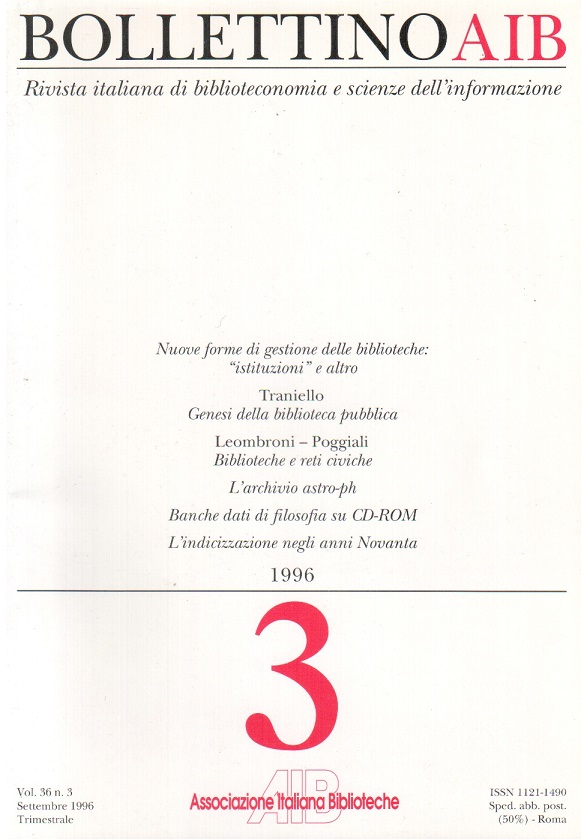Biblioteche e reti civiche: un'alleanza per la libertà
Contenuto principale dell'articolo
Abstract
The library has long lost its institutional aura as a result of the spread of information technologies, the stratification of information and knowledge contents into levels which libraries have not included in their operating horizons and the proliferation of information services, established by legislative provisions (Public Relations Offices) or to respond to the demand, unfortunately unsatisfied by traditional library services, to manage information of a broad range of origin and type. Against a backdrop of cuts in social and infrastructure spending, local councils are finding it increasingly difficult to justify the operating budget for a library service which confines itself to managing its few "traditional" functions, which appear increasingly marginal in this context of technological progress.
The library therefore faces the perennial risk of ignoring or underevaluating the external reality, and thus remaining on the sidelines of those processes being experienced by the most dynamic elements of society and the economy. The upshot is that the library is "not visible", nor considered as of strategic value by those groups which represent the most important social interests. Moreover, the free, conscious, independent and critical citizen is both a problem and need for libraries. A problem as he engenders complex and new questions and a need in that the quality of libraries' impact on the social and cultural environment derives from a process where the role of the user and the level of his capacity to make use of information resources condition the envisaged result of investments in libraries.
Civic networks, which made their debut in Italy in 1995, threaten to further push libraries to the sidelines of the information access strategies developed by local authorities. Public libraries should therefore promote themselves as "pivots" of civic networks, not only by participating in the planning of the information contents and organisation of the service, but also, and above all, by acting as a sort of "civil bulwark", in other words ensuring that civic networks are opportunities for freedom, enrichment of knowledge and do not become mere electronic bulletin boards made available by the authorities which financed them. The latter function is crucial but necessary as it inserts itself in that very delicate and much-debated relation between democracy, "cyberspace civilisation" and information technology and, at the same time, embodies the profound sense of the librarian profession's ethics for civil society and librarians themselves.
It is worth noting that the libraries which were first included or were protagonists of the civic networking projects in the United States were those which were particularly responsive to the concept of the library as a bulwark of freedom of access to information. This took place in a country where the consciousness of intellectuals and of the strong social groups to the defence and extension of civil liberties has an importance which is almost unknown not only in Italy, but also in most European countries.
Libraries and civil rights movements constitute an effective structure for rebuffing the underlying authoritarian entropy inherent in technology. As the arrangement of the technological infrastructures for information management is rapidly conforming to the model already in existence in the United States, the lack of such consciousness on the part of Italian libraries exposes us, first and foremost as citizens, to very serious risks as regards the defence of civil rights. The Italian Library Association (AIB) should therefore equip itself to play an appropriate role in this respect.
Dettagli dell'articolo

Questo lavoro è fornito con la licenza Creative Commons Attribuzione - Condividi allo stesso modo 4.0.
